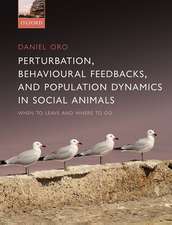The Dance of the Arabian Babbler: Birth of an Ethological Theory: Univocal
Autor Vinciane Despret Traducere de jeffrey bussolinien Limba Engleză Paperback – 6 iul 2021
How do humans study the complex worlds of animals without imposing their own societal and scientific gaze upon them? The biologist Amotz Zahavi stakes the controversial claim that Arabian babblers are said to raise themselves up each day to dance and tend to one another in the early morning sun. Such a claim will provoke the interest and intellectual curiosity of a young philosopher and psychologist recognizing that the best way for her to observe the practices of scientists at work is to join them on their terrain. Embedding herself in the field alongside ethologists in the Negev desert, Vinciane Despret deftly depicts and reflects on the process by which scientists construct their theories within the milieu of the animals they study. Along the way, and not without humor, Despret analyzes a variety of theories posited by many well-known thinkers, including Zahavi, who devoted his life to the interpretation, companionship, and conservation of the Arabian babbler bird, and naturalists such as Charles Darwin and Pierre Kropotkin.
Din seria Univocal
-
 Preț: 152.93 lei
Preț: 152.93 lei -
 Preț: 154.20 lei
Preț: 154.20 lei -
 Preț: 169.04 lei
Preț: 169.04 lei -
 Preț: 169.34 lei
Preț: 169.34 lei -
 Preț: 152.00 lei
Preț: 152.00 lei -
 Preț: 137.79 lei
Preț: 137.79 lei -
 Preț: 101.86 lei
Preț: 101.86 lei -
 Preț: 130.67 lei
Preț: 130.67 lei -
 Preț: 138.14 lei
Preț: 138.14 lei -
 Preț: 127.42 lei
Preț: 127.42 lei -
 Preț: 176.61 lei
Preț: 176.61 lei -
 Preț: 169.34 lei
Preț: 169.34 lei -
 Preț: 118.35 lei
Preț: 118.35 lei -
 Preț: 154.00 lei
Preț: 154.00 lei -
 Preț: 130.89 lei
Preț: 130.89 lei -
 Preț: 153.25 lei
Preț: 153.25 lei -
 Preț: 137.48 lei
Preț: 137.48 lei -
 Preț: 138.46 lei
Preț: 138.46 lei -
 Preț: 215.89 lei
Preț: 215.89 lei -
 Preț: 163.28 lei
Preț: 163.28 lei -
 Preț: 169.70 lei
Preț: 169.70 lei - 9%
 Preț: 141.33 lei
Preț: 141.33 lei - 13%
![[...After the Media]: News from the Slow-Fading Twentieth Century](https://i1.books-express.ro/bs/9781937561161/after-the-media.jpg) Preț: 141.58 lei
Preț: 141.58 lei - 18%
 Preț: 126.61 lei
Preț: 126.61 lei - 18%
 Preț: 126.61 lei
Preț: 126.61 lei - 14%
 Preț: 139.36 lei
Preț: 139.36 lei - 19%
 Preț: 123.77 lei
Preț: 123.77 lei - 10%
 Preț: 139.36 lei
Preț: 139.36 lei - 15%
 Preț: 129.59 lei
Preț: 129.59 lei - 10%
 Preț: 139.36 lei
Preț: 139.36 lei - 5%
 Preț: 130.75 lei
Preț: 130.75 lei - 14%
 Preț: 140.42 lei
Preț: 140.42 lei - 29%
 Preț: 97.20 lei
Preț: 97.20 lei - 22%
 Preț: 166.45 lei
Preț: 166.45 lei -
 Preț: 189.19 lei
Preț: 189.19 lei - 29%
 Preț: 97.20 lei
Preț: 97.20 lei -
 Preț: 189.13 lei
Preț: 189.13 lei -
 Preț: 142.31 lei
Preț: 142.31 lei -
 Preț: 145.74 lei
Preț: 145.74 lei -
 Preț: 231.15 lei
Preț: 231.15 lei
Preț: 169.70 lei
Nou
32.48€ • 35.29$ • 27.30£
Carte disponibilă
Livrare economică 29 martie-12 aprilie
Livrare express 15-21 martie pentru 21.77 lei
Specificații
ISBN-10: 1517911524
Pagini: 184
Dimensiuni: 127 x 203 x 15 mm
Greutate: 0.29 kg
Editura: University of Minnesota Press
Colecția Univ Of Minnesota Press
Seria Univocal
Notă biografică
Vinciane Despret is a philosopher and psychologist who has published on the relation between the human and the animal. Her most recent books include What Would Animals Say If We Asked the Right Questions? (Minnesota, 2016), Au Bonheur des Morts, and Habiter en Oiseau.
jeffrey bussolini is associate professor of sociology and anthropology at the City University of New York and codirector of the Center for Feline Studies. She is coeditor of The Philosophical Ethology of Vinciane Despret.
Cuprins
Contents
Acknowledgments
Translator’s Introduction
jeffrey bussolini
Introduction
Part I. The Ethological Debates
1. The Theoretical Context: The Two Paradoxes of the Theory of Evolution
Altruism
Sexual Selection
2. Rituals Between Altruism and Reproductive Function
Part II. The Dance of the Babbler
3. The Arabian Babbler
4. Models and Methods: Outline of a Field Study
5. Narratives and Metaphors
6. Models and Fictions
Conclusions
Notes
Recenzii
"It is with this book that Vinciane Despret introduced her unique research style: follow scientists with the same care that they followtheiranimals and select among animals those that render their scientists most interesting! This is how she taught her readers to escape the stultifying ‘voice over’ of so many nature narratives. Be ready for quite a dance."—Bruno Latour
Descriere
A groundbreaking reflection on the process by which one arrives at an ethological theory
How do humans study the complex worlds of animals without imposing their own societal and scientific gaze upon them? The biologist Amotz Zahavi stakes the controversial claim that Arabian babblers are said to raise themselves up each day to dance and tend to one another in the early morning sun. Such a claim will provoke the interest and intellectual curiosity of a young philosopher and psychologist recognizing that the best way for her to observe the practices of scientists at work is to join them on their terrain. Embedding herself in the field alongside ethologists in the Negev desert, Vinciane Despret deftly depicts and reflects on the process by which scientists construct their theories within the milieu of the animals they study. Along the way, and not without humor, Despret analyzes a variety of theories posited by many well-known thinkers, including Zahavi, who devoted his life to the interpretation, companionship, and conservation of the Arabian babbler bird, and naturalists such as Charles Darwin and Pierre Kropotkin.

























